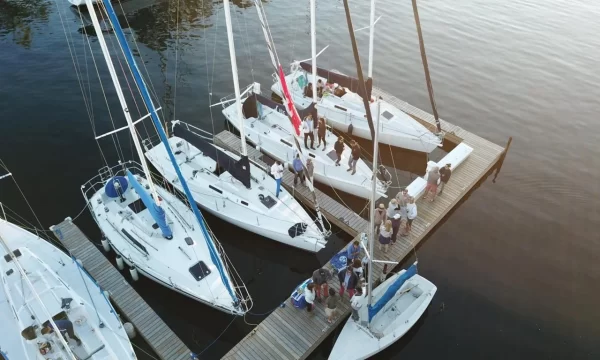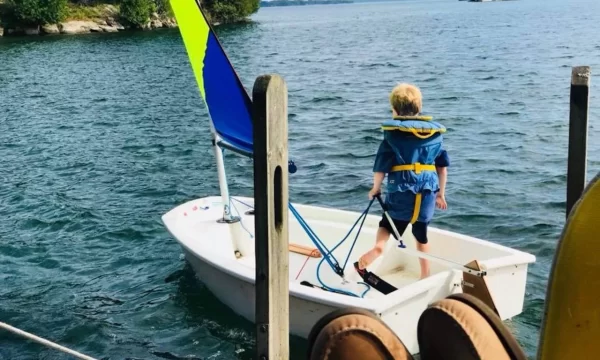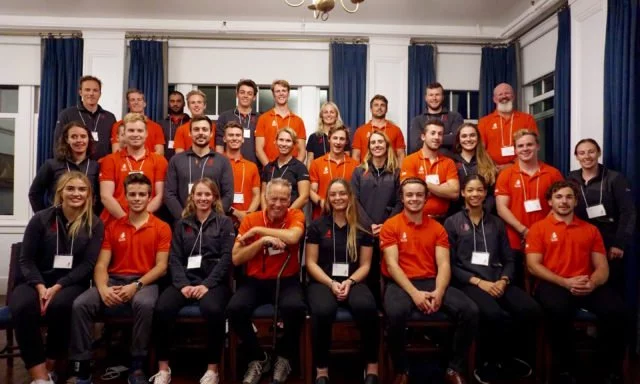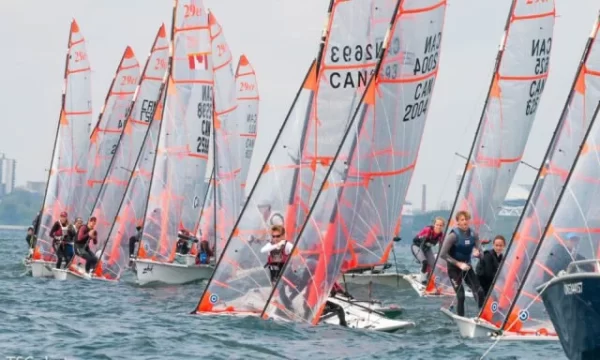Forty-five years ago, Michael de la Roche was one of 12 Canadian representatives in sailing at the 1976 Olympic Games in Montreal. “On Deck” conversation with the sailor from the province of the host city, Quebec.
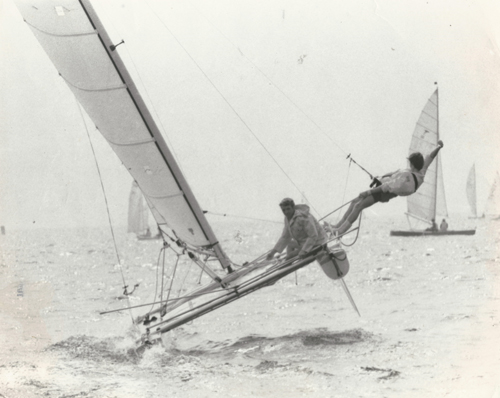 The 1976 Olympic Games were held 45 years ago. What are your most vivid memories from those Games?
The 1976 Olympic Games were held 45 years ago. What are your most vivid memories from those Games?
We felt tremendously honoured to be representing Canada and Quebec. Quebec had a particularly strong Tornado Fleet with Brian Palfreman and Don Cote who were absolutely great competitors, so we felt very lucky to be the ones who had qualified to represent Canada.
You finished 7th in the Multihull-Mixed event with Larry Woods. Were you satisfied with your performance?
We had just come back from the World Championships in Australia, where we placed 4th, so we had hoped to do better in Kingston and were hoping for a medal. I think we sailed a solid regatta. We had a bit of bad luck out on the course but ultimately, we were proud of our performance and exceedingly happy to see Reg White from England take home the gold. Reg, you may recall, was one of the original designers and promoters of the Tornado Catamaran as well as a superb athlete and sportsman.
What are your fondest memories of Larry Woods?
Larry was the consummate competitor. Fierce out on the course, but always ready to help anyone and everyone improve. I remember him helping the newer sailors in the class with rigging and tuning their boats as well as with tactics. He would do this to a greater or lesser extent at pretty much every regatta as he felt strongly that the better the competition, the better everyone sailed. I can’t remember a time when he didn’t have a massive grin across his face, especially when sailing. When I think of the qualities of an Olympian, Larry comes immediately to mind. He was a sportsman above all else.
Those were your first and last Olympic Games. Did the boycott of the 1980 Games have an impact on your career?
Not really. I had decided to try to enter the field of medicine and as such, my efforts were focused on that, which pretty much excluded a lot of the sports and activities that I would have liked to have done at the same time.
With the Games being held in your home province, did you feel the buzz leading up to Montreal 1976 and, if so, what do you remember the most about this buildup?
I was mostly training in Kingston, where I had moved to go to university and train. Certainly, when we went to competitions in Quebec, the excitement of the upcoming Olympics was palpable with Olympic flags pretty much everywhere.
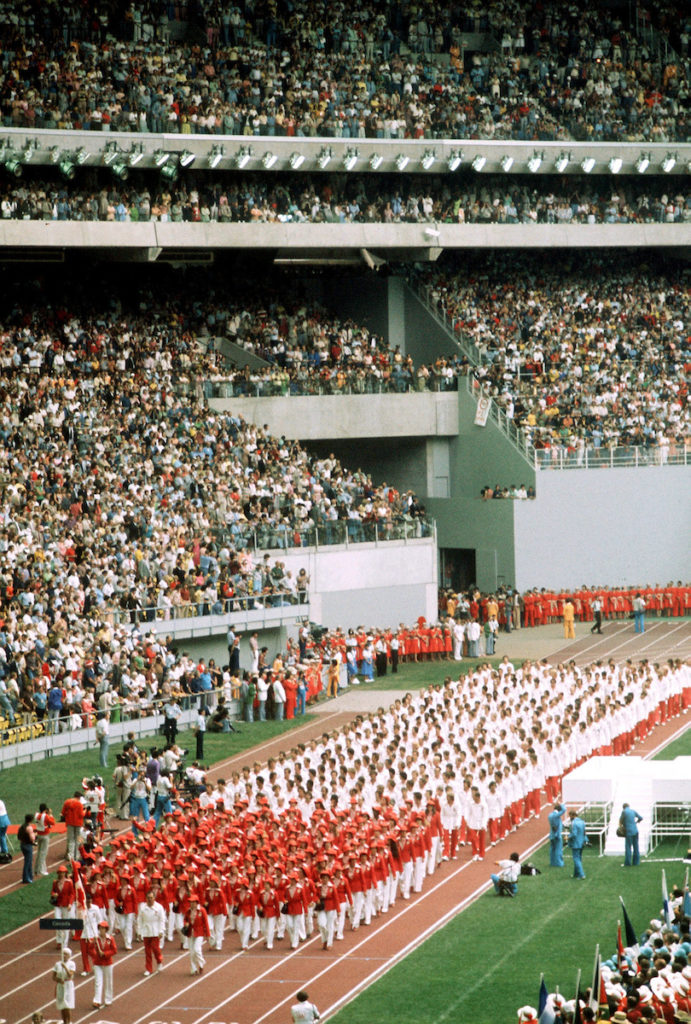
Canadian athletes make their entrance at the opening ceremonies for the 1976 Olympic games in Montreal. (CP PHOTO/COC/ RW)
Les athl̬tes canadiens font leur entrÌ©e lors des cÌ©rÌ©monies d’ouverture des Jeux olympiques de MontrÌ©al de 1976. (Photo PC/AOC)
As someone from Quebec, how proud were you to see your province host the Olympic Games?
I thought Quebec did a tremendous job hosting the Olympics. These were the first Olympics after Munich and to have a proper balance in terms of security for the athletes in regards to the spectators and the media was a monumental change and challenge as compared to previous Olympics. It really set the stage for all future Olympic Games.
Did you attend the Opening Ceremonies? If so, what is your fondest memory from that?
Yes, and what struck me most was the absolutely deafening and prolonged cheer that was heard when the Canadian Team entered the stadium.
Sailing competitions were held in Kingston. How did you feel about experiencing the Olympic Games at a remote site outside of your province?
Well, at that time I was living and going to University in Kingston, so it was somewhat anticlimactic to not go away for the Olympics. That was perhaps the biggest opportunity that we, as the host nation, experienced. The good part was that it was being held in Canada, and in a way that was the bad part too, because we didn’t get to travel and be hosted by some other country and, in my case, some other city even.
You were the doctor for the Canadian sailing team at Tokyo 2020. How exciting is it to still be involved in sailing in that way?
I must confess that I am profoundly proud and honoured to be able to continue to be affiliated, however peripherally, with these exceptional athletes. To say I am humbled by their achievements is an understatement. I consider myself lucky to have the very unique opportunity to provide advice and counsel not only as a medical professional, but also as someone who was previously an athlete and who has some understanding of what the sport of sailing entails, including the environmental factors that sailors must, by virtue of the sport, function within.
As a doctor, what are the types of injuries that you see most often in sailing and what can kids do to try and prevent them?
This is a GREAT question. I get asked this fairly frequently and my answer has evolved over the years, as our understanding of human physiology and performance matures. I would say that there are three major injuries that we must pay attention to these days.
In sailing, the most common “injury” would be hypo- and hyperthermia. These are not things that we used to pay much attention to, but they both can significantly affect an athlete on and off the water, and for the most part, it can be easily mitigated with proper planning and attire. Furthermore, the effects of one or the other can be potentially catastrophic if left untreated.
As a second injury type, I would have to say closed head injuries (concussions). Traditionally, we have not paid a lot of attention to head-to-boom interactions but these can be significant and we need to be paying perhaps a bit more attention to techniques to minimize these as they, too, can lead to significant morbidity and even mortality in rare cases.
The third, and probably the most common “injury”, if you want to use that term, is that of the psychological health of the athlete and dealing with the stress of competing, training, work, family and the intricate balancing act that an athlete, and any athlete in any sport, must manage. Again, this is not something we paid much attention to four decades ago, but it certainly has a major impact both on immediate performance as well as on long-term life skills, and we are starting to give it the attention that it deserves.
Do you still go out sailing?
Absolutely. Not on multihulls these days (although I am considering a UFO foil). I have two Lasers and both my children are sailors. When not sailing the Lasers, I can at times be seen windsurfing; itÛªs always a source of amusement for those more skilled around me. As they say, sailing is a life sentence.

